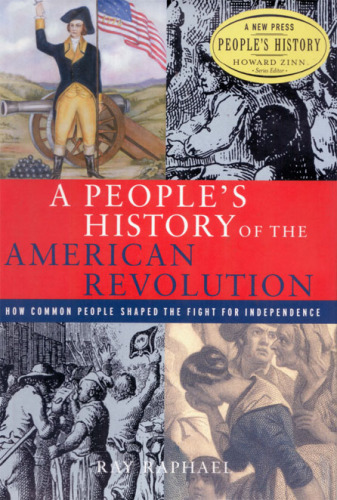
A People's History of the American Revolution
How Common People Shaped the Fight for Independence
کتاب های مرتبط
- اطلاعات
- نقد و بررسی
- دیدگاه کاربران
نقد و بررسی

April 1, 2001
California-based writer Raphael (An Everyday History of Somewhere; etc.) offers an accessible study of the American Revolution, as part of a series edited by Howard Zinn, and in the tradition of his A People's History of the United States. Most books on the Revolution focus on generals and kings, although scholars have, in the last two decades, turned some of their attention to the lives of ordinary people. Raphael transforms the best insights of that scholarship into a lively, readable narrative. Yes, kings and generals were important, but it was the people at large who brought about American independence. Even before the war started, ordinary people were involved in protesting British abuses, refusing to consume tea and other British luxury items. Women supported the Revolution by spinning their own cloth (rather than buying it from Britain) and working the farms their husbands left behind when the militia called them to the front. Young men eager to "git" their rights uncomplainingly subsisted on moldy bread while they camped out in the snow, waiting to encounter Redcoats. White colonists weren't the only Americans affected by the war. Abenaki Indians, for example, were paid to fight alongside the rebels. Raphael also shows how many slaves, infected with the freedom-fighting spirit, bid unsuccessfully for their own independence via insurrections, escape and reasoning. Both English and American armies wanted the slaves' loyalties, and the slaves, in turn, believed that if they served the winning side, they would gain freedom. Moving from broad overviews to stories of small groups or individuals, Raphael's study is impressive in both its sweep and its attention to the particular. The book will delight, educate and entertain all Revolution buffs.

January 1, 2001
Raphael (Men from the Boys: Rites of Passage in Male America) narrates the American Revolution from the eyes of the common people who, without wealth, authority, or privilege defined and shaped the Revolution. He argues that the Revolution was largely the product not of the patrician classes of Virginia or New England but of the common people. Through letters, diaries, and other accounts, Raphael shows these individuals--white women and men of the farming and laboring classes, free and enslaved African Americans, Native Americans, loyalists, and religious pacifists--acting for or against the Revolution and enduring a war that compounded the difficulties of everyday life and that resulted in a higher percentage of American civilian and military deaths than any of America's other wars except the Civil War. Written for the lay reader, this work synthesizes recent historical scholarship on the Revolution and maintains the high standards of editor Howard Zinn's "People's History" series. Strongly recommended for public and academic libraries.--Charles L. Lumpkins, Pennsylvania State Univ., State College
Copyright 2001 Library Journal, LLC Used with permission.

March 1, 2001
Not a narrative of battles, not an analysis of causes, not a paean to patriotism, not a tarring of Tories, Raphael's volume instead collects the experiences of ordinary people during the American Revolution and sutures them into a story. And that story is that the rebellion and war inescapably influenced everyone--farmers, townspeople, women, Indians, free blacks and enslaved blacks, plutocrats and proletarians. And a list including such categories indicates the class-consciousness of this, the inaugural volume in a series overseen by leftist historian Howard Zinn. A synthesis of radical historiography on the Revolution already exists in Gordon Wood's " The "Radicalism of the American Revolution (1992), so the unique value of Raphael's work lies in its mining, from extant primary sources, of the extraordinary recollections of ordinary witnesses to history. Patron demand for Raphael's tome may never be as high as that for the most popular Revolutionary War narratives and biographies, yet this book constitutes a substantial alternative to "great-man" approaches to the upheaval.(Reprinted with permission of Booklist, copyright 2001, American Library Association.)

























دیدگاه کاربران